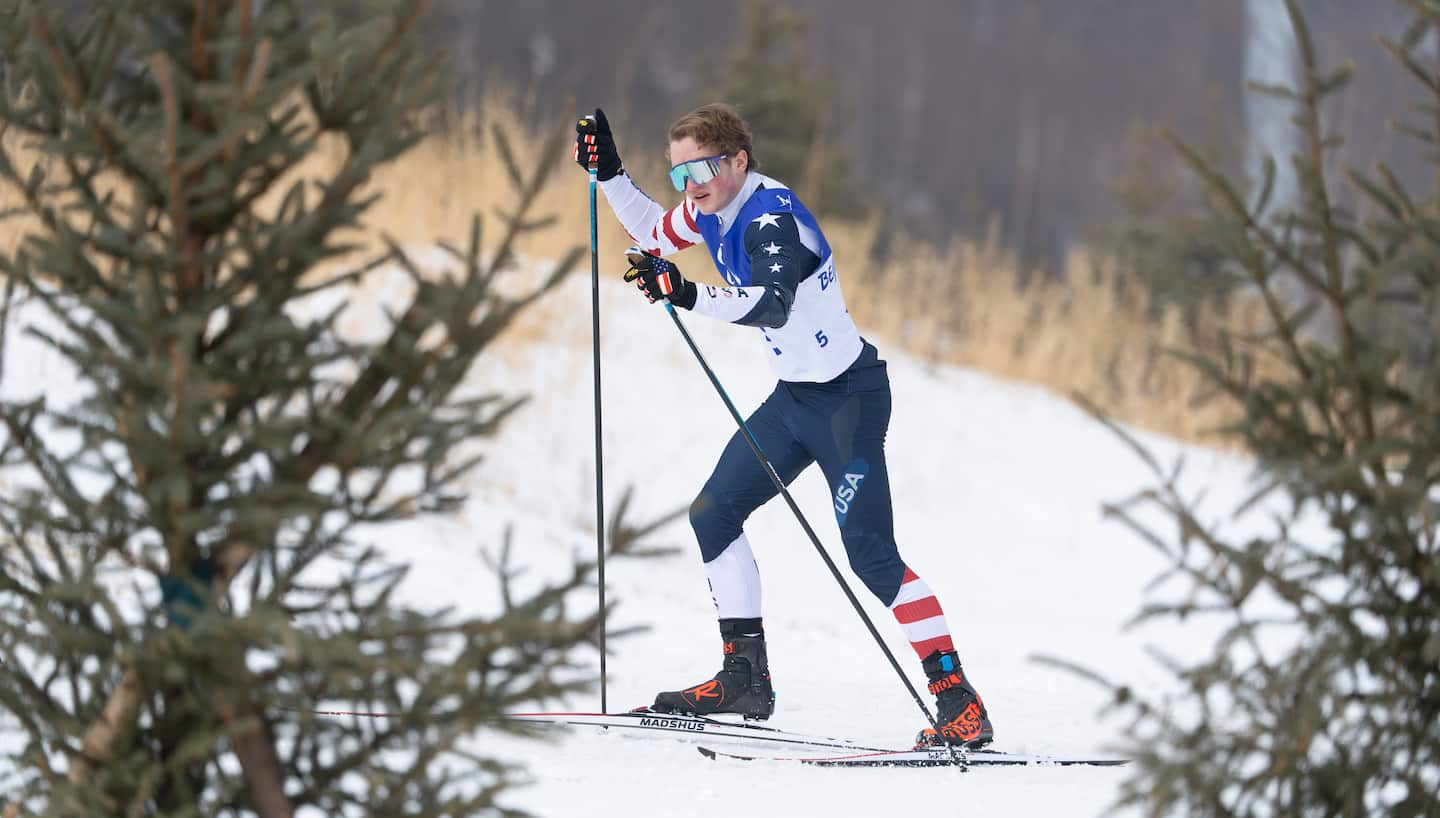
Team USA’s Duluth Training Camp Doubled As College Orientation For Max Nelson
by Alex Abrams

Max Nelson competes at the Paralympic Winter Games Beijing 2022. (Photo: Mark Reis)
In some ways, Max Nelson is a typical college freshman.
He’s both excited and nervous to start classes in a few weeks at the College of St. Scholastica in Duluth, Minnesota. He has met new people on campus this summer, and he’s still getting adjusted to college life.
In other ways, the 18-year-old teenager from Grant, Minnesota, is unique.
Nelson missed around three weeks of his senior year of high school so he could make his Paralympic debut as a Nordic skier at the Beijing Winter Games in March. He helped the Americans finish ninth in the cross-country open relay.
Four months later, a special group of friends visited him at college.
In late July, U.S. Paralympics Nordic Skiing decided to hold a weeklong training camp in Duluth, in large part so several coaches and fellow Paralympians could help Nelson get more acclimated to St. Scholastica.
Nelson is visually impaired, and he initially wasn’t sure how to get around the college’s small campus.
“For every visually impaired person, it’s kind of hard. We worry about where our classes are or where do we get our food because we don’t know where to go for that stuff,” Nelson said. “I mean, sure, we can ask for help, but it’s still a lot to take in at once.”
Mia Zutter, another visually impaired skier who competed for Team USA at the 2018 Winter Paralympics in PyeongChang, graduated from St. Scholastica in 2021.
The training camp that U.S. Paralympics Nordic Skiing held in Duluth from July 20-27 served as both a freshman orientation for Nelson and a week of high-intensity workouts for seven athletes.
The crew helped Nelson find his way around campus. He’s enrolled in three classes for the fall semester, and he learned where the classrooms are located and how to get to his dorm room and the library.
“I really appreciate that they went out of their way to get me used to my campus, especially when there was no one there. It was really nice,” said Nelson, who plans to ski for the St. Scholastica. “We kind of had the whole campus to ourselves, but that was super nice of them. They’re kind of like my second family in a way.”
At the same time, Nelson joined Paralympians Ruslan Reiter, Dani Aravich and Grace Miller as they spent the week bonding and training for the upcoming Nordic skiing season. They lifted weights, rode mountain bikes and worked on their skiing technique while roller skiing on the Willard Munger State Trail, which runs between Duluth and Hinckley, Minnesota.
Nick Michaud, a development coach for U.S. Paralympics Nordic Skiing, said the national team was looking to hold a training camp at a new location that was at sea level instead of in the mountains as usual.
Duluth, an outdoor-centric city located at the western tip of Lake Superior, was the perfect place for the training camp, and Michaud said it could be a more laidback week of workouts since the Paralympic Winter Games Milano Cortina 2026 are four years away.
“We like to think about Year 1 of the quad being a time to slow down, change the way we do things a little bit (and) try some new stuff because it’s the furthest away we get from the pressure and buildup of the Games,” Michaud said.
“And so we were looking at different sea-level places, and then we were thinking, ‘OK, Max Nelson is going to start at the College of St. Scholastica in the fall.’ And as a visually impaired person, there are a lot of barriers to just hopping right into college.”
During their week in Duluth, the Paralympians trained on roller skis every day and took part in an uphill time trial. They also had the opportunity to go sailing and enjoy some quiet time.
“It was a big volume week for us, so it was 20 hours of training in one week. So it was quite a bit,” Nelson said. “It was wake up at 7, get breakfast, go out and train and then later in the day we’d go out for another training session. It was a lot.”
Michaud said Duluth, which is at around 700 feet elevation, offered a nice change of pace for those Paralympians who live and train in Bozeman, Montana, which has an elevation of just under 5,000 feet.
“At a very elementary level, you can produce more power and go a lot faster at sea level,” Michaud said. “And so for athletes that live above 4,000 feet year-round, we try to give them a couple of weeks of opportunities throughout the year to spend time at sea level practicing just going straight-up faster.”
Perhaps even more importantly, they helped Nelson get ready to start college.
Nelson said he considered attending Montana State in Bozeman, but St. Scholastica seemed like a great fit for him.
“For me, it’s close to home. It has a really good ski team. The campus is small, which is very convenient for a visually impaired person,” Nelson said. “It’s not hard getting around, and also, I just love Duluth.
“So there were so many pros I was like ‘Oh man, I just have to choose this.’”
Alex Abrams has written about Olympic and Paralympic sports for more than 15 years, including as a reporter for major newspapers in Florida, Arkansas and Oklahoma. He is a freelance contributor to USParaNordic.org on behalf ofRed Line Editorial, Inc.